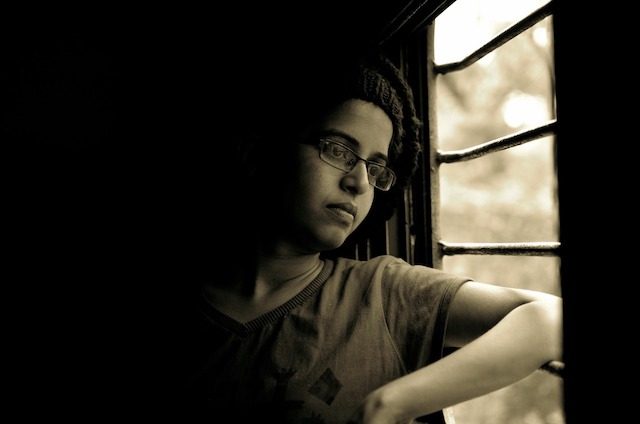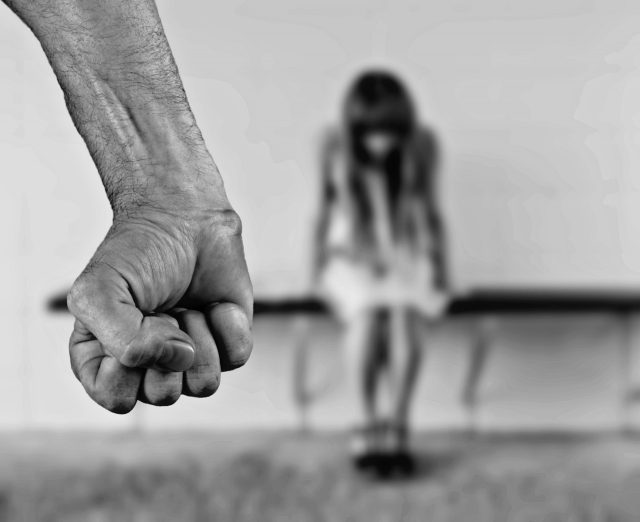(单词翻译:单击)
5.Abusers With Drug Problems Will Convince Themselves They Are Not Bad People
5.沾染毒品的施暴者往往自以为是个好人

Many abusers have drug problems, as many of you probably already know. Whether the drug problem is partly due to abuse they experienced, or more the main cause of their terrible behavior or not, it can make for the worst kind of abuser. This type will be really nice when they are sober, or sometimes it is the opposite – they will be really nice as long as they have their drug of choice. However, if they are in the wrong mental state, people will be hurt, and children and spouses will be abused and traumatized.
很多施暴者吸毒,大多数人可能都知道这一点。因为他们经历过家暴,更多则是因为他们自身的恶劣行径,不管是出于这两种原因的哪一种,都会使他们成为最让人头痛的施暴者。这种类型的人在神智清醒的时候就是好好先生,但有时却恰恰相反——因为只有当他们有毒品可吸的时候才会露出善容。但是,一旦他们精神失常,就会伤害身边的人,连孩子和配偶都会遭到他们虐待和摧残。
These people will convince themselves they are still good people, explaining it away as the drug doing the work. They will keep telling themselves that they will quit, and find it easy to make excuses, since they often don't remember what they did during their rage blackouts. Unfortunately, spouses are also often likely to defend this type of abuser, because they see the nice person they can be at times, and try to defend who they believe the person "really is inside." People like this often need serious treatment for substance abuse, and have had trauma in their past that causes them to lash out at others when they are in that specific mental state. They may not necessarily be evil people, but they probably should be somewhere they cannot hurt others.
这些暴虐的瘾君子还会觉得自己仍然是好人,并把施暴行为解释成是受到毒品影响造成的。他们不停地告诫自己要戒毒,但借词卸责很容易,因为他们往往忘了自己在丧失理智的时候干了什么。悲剧的是,配偶因为目睹过施暴者有时会变得很友善,也会为他们辩护,并相信“友善的那个才是真正的对方”。对于像这种滥用药物的人,通常需要对其进行严格治疗,而曾因家暴受过重大伤害的人,当他们处于某种特定的精神状态时,就会开始攻击他人。他们不一定是恶人,但他们可能的确应该呆在某个无法伤害他人的地方。
4.Well-Meaning Spouses Who Protect Their Abusers Often Cause More Harm To Their Children
4.好心的配偶保护了施暴者,却招来他们对孩子更多的伤害

Some spouses really simply believe that their abuser is actually a good person. They will defend them to the ends of the earth, and in their mind, there is really nothing going wrong. Oftentimes this is the type of situation where the spouse may not actually be the victim of most of the abuse, but the children are really taking the brunt. Sometimes these spouses are so blinded by their love and devotion to their partner that they shrug off what is definitely physical abuse as just being "tough love."
一些配偶天真地认为自己的伴侣虽然有家暴倾向,但实际上是个好人,哪怕天荒地老也会护着伴侣,在他们看来并没有什么不对劲。在这种情况下,配偶大多可能并不是家暴受害者,孩子们才是发泄对象。有时候,有些配偶对伴侣的爱和忠诚是如此盲目,以至于对到底什么是身体虐待不管不顾,而仅仅认为那是一种对孩子“严厉的爱”。
In many of these sad situations, it takes intervention from extended family members, teachers, or others to notice something, and can often still be an uphill battle. The spouse will be convinced that it's just strong discipline and that their devoted partner is really super gentle. They will go to great lengths to defend them, while the child continues to be hurt. Sometimes they simply cannot accept that the person they love is violent or dangerous, and other times they do not understand how the strength of their spouse, or their own strength, is hurting their children. Some people caught up in these situations do not mean ill, but do not understand their own strength, or the harm a strong adult can do a child when physical discipline is taken too far. Some spouses caught in situations like these realize something is wrong, but are not sure if it is bad enough to ruin their marriage and go to all the trouble over. This can lead to allowing a sitution that is dangerous for the children to go on, and on.
在这种让人痛心的情况下,需要家庭成员、老师或其他人的干预来引起注意,即便如此,处理起来通常也会异常艰难。有的配偶认为打骂孩子只是出于严格的家教,而他们忠实的伴侣实际上非常温柔。他们会不遗余力地为施暴者辩护,而孩子则会继续受到伤害。有时他们不愿承认自己的爱人既暴力又危险,而有时他们也不明白自己和配偶是如何伤害到孩子的。在这种情况下,他们并非怀有恶意,只是不理解,当体罚过度,他们自己或者一个强壮的成年人会对孩子造成什么样的伤害。陷入这样的困境,一些人终于意识到出了问题,但又不确定这个僵局是否到了需要以婚姻为代价去处理的地步。对孩子们而言,这可能会引发又一轮危机,循环不止。
3.Domestic Abusers Usually Abuse Both Their Spouse And Children If Applicable
3.家暴者通常很可能虐待配偶和子女

While we did talk about situations where only one or sometimes both parents are abusing the children, and not each other, more often than not abuse of one implies abuse of others. People who tend to be violent against other people are often not that discriminatory in who they hurt. They are often broken or damaged people lashing out at others in an attempt to quell their own internal pain and trauma. When they reach that point, whether out of anger, or brought about by drugs, where they want to cause pain, the target they go for is simply usually whoever is closest and most convenient.
虽然我们讨论的是只有一方或双方父母都在虐待子女的情况,而不是他们互相伤害,但更常见的情况是虐待他人。那些有暴力倾向的人在伤害他人时往往不会因对象不同而有任何差别。通常他们都受到过伤害,并以折磨他人来平息内心的痛苦和创伤。不管是出于愤怒,还是药物作用,当内心情感达到一定程度,他们发泄的目标通常是最亲近和最容易接触到的人。
This means that in most cases, abuse of a spouse usually implies abuse of children and of course the other way around as well. There is also reason to believe that those who abuse their spouses are not only likely to abuse their children, but very likely to make that abuse of a sexual nature as well, instead of simply being violent. These people often do a really good job of putting on a respectable public face to the world, and will often keep the family under brutal psychological control so that they don't spill the beans to others.
这就意味着,在很多情况下,虐待配偶意味着也会虐待儿童,反之亦然。我们有理由相信,那些虐待配偶的人不仅有可能虐待他们的孩子,还有可能进行性虐待。面对公众时,他们通常会以良好的形象示人,同时对自己的家人进行残酷的精神控制,以确保他们不会泄密。
Many abusers are very charismatic in their own way, and this is part of how they manage to keep people in line. Sometimes they will be mean, but other times they will act almost unnervingly nice. One study that delved into the matter looked into 1,000 women who were victims of abuse, and found that in 70% of cases, violence against children was also a regular problem from their spouse. To make matters worse, the more children there were in the family, the more likely there was to be child abuse as well – although the abuse of the children was usually less brutal than that directed toward the spouse.
很多施暴者都有自己的特性,这是其他人对他们看法一致的地方之一。有时候他们行事卑鄙,有时候又好得让人害怕。曾有一项研究对1000名受过虐待的妇女展开调查,结果显示在70%的案例中,儿童遭到家暴,问题也往往源于她们的配偶。更糟的是,家里的孩子越多,他们遭到家暴的可能性就越大——虽然孩子受到的虐待通常不像配偶受到的那么残忍。
2.Most Households With Physical Abuse Also Have Instances Of Sexual Abuse
2.大多数有身体虐待情况的家庭也存在性虐待

As we mentioned above, homes that have physical abuse going on are often also home to sexual abuse. However, it may be more common than most people would like to believe. People who abuse their wives are about 4 to 6 times more likely to sexually abuse their children, and about seven times more likely to hit their children. According to studies, about half of abusers who take part in incestual practices also hit the mother of the children they are having incestual relations with. Experts are now suggesting that if there is any past history of violence against the spouse, that authorities should treat it as a strong possibility that the children are also being physically and sexually abused.
正如我们之前提到的,有身体虐待情况的家庭通常也存在性虐待。这种情况可能比大部分人认为的更加普遍。虐待妻子的人,有4到6倍的可能性会性侵子女,约7倍的可能性殴打子女。有调查显示,在对子女进行过性虐待的人中,有一半人也会殴打妻子。如今专家们建议,对配偶有家暴史的家庭,有关部门应该重视起来,他们的孩子很有可能正在遭受身体虐待和性虐待。
Some researchers caution, though, that people shouldn't focus too much on the physical or sexual aspects and forget the root causes or the more invisible abuse. These abusers are often incredibly skilled at manipulating their victims psychologically, and have a pattern of behavior that victimizes others in general. These people cannot simply be taught not to hit others, as the issue is far more complicated than that. These abusers often have serious issues that involve past life experiences or upbringing, and changing their attitude properly could be a very long and complicated process even if they were willing.
有研究人员提醒说,人们不应过于关注身体虐待或性虐待方面的问题,而忽略了家暴的根本原因或无形的暴力。这些施暴者往往非常擅长从心理上操控受害者,并且形成了一种会伤害他人的行为模式。对于这些人,不能用简单方法去教育他们不要伤害别人,因为问题比这复杂得多。施暴者过去的生活经历或受教育环境都存在严重问题,哪怕他们愿意作出改变,能恰如其分地改善他们的行为态度可能也是一个漫长而复杂的过程。
1.Far Too Often, The Abuser Ends Up With At Least Partial Custody Of The Children
1.施暴者通常最终会得到孩子的部分监护权

Most people would think that if someone is being abused by a spouse, and they decide to leave, no matter the circumstances, that they will end up with the children. Unfortunately, the children are far too often caught in a dangerous situation where the abuser ends up with full or at least partial custody – allowing them to continue to wreak physical and emotional harm. What happens is that people will sometimes leave while leaving the children behind – even if they can make a decent case they were abused, this can make it difficult to get full custody later, as you abandoned the children.
大多数人会认为,当有人遭到配偶家暴而决定离开,孩子们的监护权无论如何都会被法院判给他们。不幸的是,最终施暴者至少会得到子女的部分监护权,而孩子们往往身陷险境——如此一来,等同于允许他们继续对孩子进行身体和精神伤害。受害者有时会抛下孩子离开,即使他们正大光明地申诉自己受到虐待,也很难得到孩子全部的监护权,因为你抛弃了孩子独自离开。
On the other hand, if you take them with you, you can also be in a situation where you end up losing custody, or not getting it fully. The reason for this is that your spouse has partial rights to the children until the court decides otherwise, so if you take them away without a court order, they may just side against you. This gets more complicated by the fact that proving domestic violence can sometimes be a "he said, she said" situation, and while kids can be witnesses, they can also be unreliable witnesses at times. They may lie to stay with one parent they like, or not understand the situation properly.
另一方面,就算带着孩子一起走,你也可能失去全部或部分监护权。究其原因,直到法院作出判决之前,你的配偶依旧对孩子有部分监护权,所以如果你没有得到法院的许可就擅自带走孩子,就很有可能失去监护权。有事实表明,为家庭暴力作证有时陷入了“据他或她讲”这样道听途说的局面,就算孩子作证,有时也可能不可靠。他们可能对实际情况一知半解,或可能为了与自己喜欢的父亲或母亲在一起而撒谎。
In one horrible case, a woman was shortly with an abusive boyfriend, and he got in touch with her again later and found out she had had a child that was actually his. He demanded partial custody just to get in touch with her, even though they were not even close. He just wanted to spite her. After getting orders for partial custody, she was so scared of him being in control of her baby that she fled across the country with the child. Unfortunately, this caused her to lose all rights to her baby and the child ended up permanently with her abusive former boyfriend. This sad story shows that when it comes to domestic violence issues, we still have a long way to go in ensuring the right thing happens, justice is served, and children end up with the people who will take good care of them.
有一个很可怕的案例,一个女人和一个有家暴倾向的男友进行了短期相处,后来他又和她取得了联系,发现这个女人已经有了孩子,而自己就是孩子的父亲。为了能联络她,该男子要求得到孩子部分监护权,虽然他们此时已经不再是恋人了。实际上他这么做只是想刁难这个女人。在男子得到孩子部分监护权后,这个女人非常害怕自己的孩子会受到他的控制,于是她带着孩子逃往全国各地。不幸的是,这样一来她就失去了对孩子的所有权利,而最终孩子永远落入了她的虐待狂前男友手中。这个让人痛心的案例表明,对于正确处理家庭暴力事件,让正义得到伸张,让孩子们最终能判给可以好好照顾他们的人,我们依旧任重道远。


